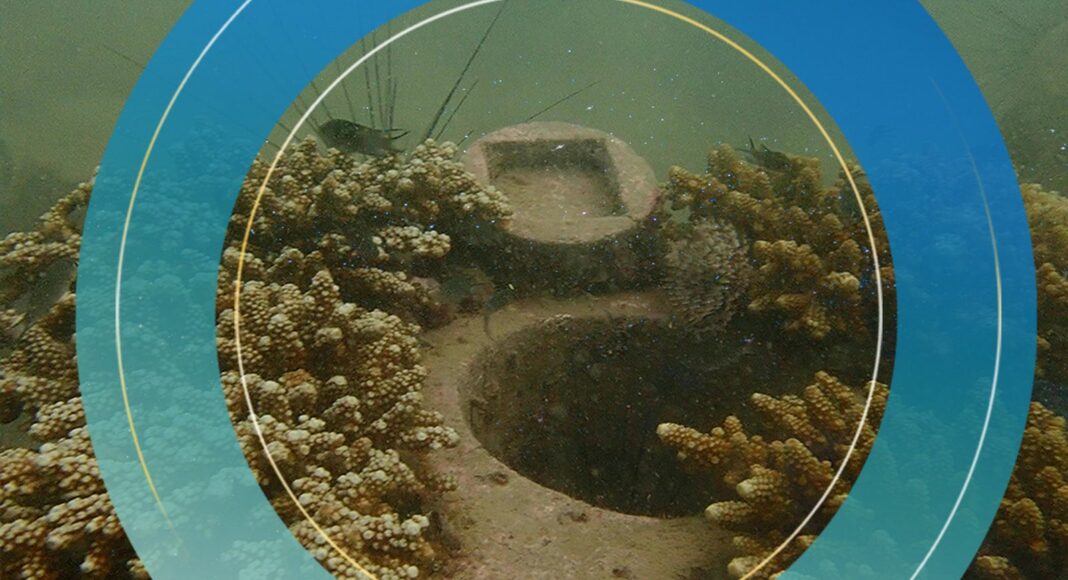Scientists in Thailand are performing “coral IVF” in an attempt to protect reefs from rising sea temperatures.
The planet has lost around half of its coral reef cover since the 1950s.
Experts warn that without intervention – climate change, pollution, and human activity, will mean almost all of the remaining coral reefs could disappear in less than 30 years.
Image:
Mature staghorn coral at Lizard Island, Great Barrier Reef was bleached in February 2016. Pic: ARC Centre
At Thailand’s Chulalongkorn University, marine biologists have been growing coral which is seemingly more resistant to higher sea temperatures.
“Right now, climate change is killing the coral in this region, particularly in the upper gulf of Thailand.
“So what we’re trying to do is to restore the coral by collecting coral eggs and sperm and then fertilising it.
“Then we raise them until they’re two years old, and during the two years we try to make them adapt to the rising temperatures,” explains Dr Suchana Chavanich, a marine biology professor at Chulalongkorn University’s Reef Biology Research Group.
Image:
Dr Suchana Chavanich holding coral
Growing more species that are heat-resistant involves, what the professor terms “coral IVF”.
During the spawning season at the start of the year, coral polyps simultaneously release sperm and egg bundles.
Image:
Coral spawning. Pic: Reef Biology Research Group, Chulalongkorn University
Image:
The coral is grown in a hatchery tank
In Thailand, the exact date is hard to confirm so to ensure they don’t miss it the scientists dive every night for three months accompanied by Thai Navy SEALs.
In the dark water, using a big mesh bag contraption, they collect the sperm and eggs before separating them in the lab so they can control the fertilisation conditions.
“My job is to collect eggs and sperm underwater in the night. It’s difficult to see and working at night means there are many things we need to be cautious about such as visibility and underwater dangers that we can’t see,” says Thai Navy SEAL commander, Rear Admiral Supachai Tanasansakorn.
Image:
Rear Admiral Supachai Tanasansakorn
After fertilisation, the coral is then grown in tubs in a hatchery.
It can survive at 34C (93.2F), whereas water over 32C (89.6F) can kill wild coral.
“Scientists have predicted in the next 30 years if we don’t do anything, 95% of the coral around the world will disappear.
“So, it’s quite scary because coral is home to thousands of animals and gives so many things to us. I think it’s time for us to do something seriously about climate change,” says Dr Chavanich.
One of the biggest threats to coral is bleaching.
Image:
Scientists have been doing underwater gardening
It can be caused by factors including rising sea temperatures due to climate change, pollution, and too much sun.
Under stress, coral expels the algae needed to stay healthy, leaving it white and vulnerable. While some recover, many die.
Global warming has wiped out 14% of coral in a decade according to a recent report by the Global Coral Reef Monitoring Network.
Between 2009 and 2018 it says reefs equalling about 11,700 square kilometres were killed. That’s around 2.5 times the size of Grand Canyon National Park.
“It’s sad… people say the coral bleaching is because of natural phenomena but if you think carefully climate change is because of us,” says fellow marine biologist, Dr Suppakarn Jandang.
“If we pay attention and care more about our ecosystem it would be good for our environment and our planet.”
Once the more heat-resistant coral is around two years old it can be planted in the sea.
This involves a kind of extreme gardening where the scientists have to dive down to the seabed and stick the tiny baby corals to artificial reefs.
With the help of the Thai Navy SEALs, they have grown and planted more than 10,000 so far but if the Earth continues to warm at its current rate, coral reefs don’t stand a chance.
0:59
How to build a coral reef
“We need to do something now seriously about carbon dioxide emissions. We have to do everything to try to reduce those emissions as fast as possible,” Dr Chavanich warns.
Tropical coral reefs cover just under 0.1% of the ocean but support more than 25% of marine life, according to the United Nations.
More than 500 million people around the world rely on them for jobs, food – so scientists say a global commitment to protect them and prevent a universal tragedy is needed.
Watch the Daily Climate Show at 6.30pm Monday to Friday on Sky News, the Sky News website and app, on YouTube and Twitter.
The show investigates how global warming is changing our landscape and highlights solutions to the crisis.




